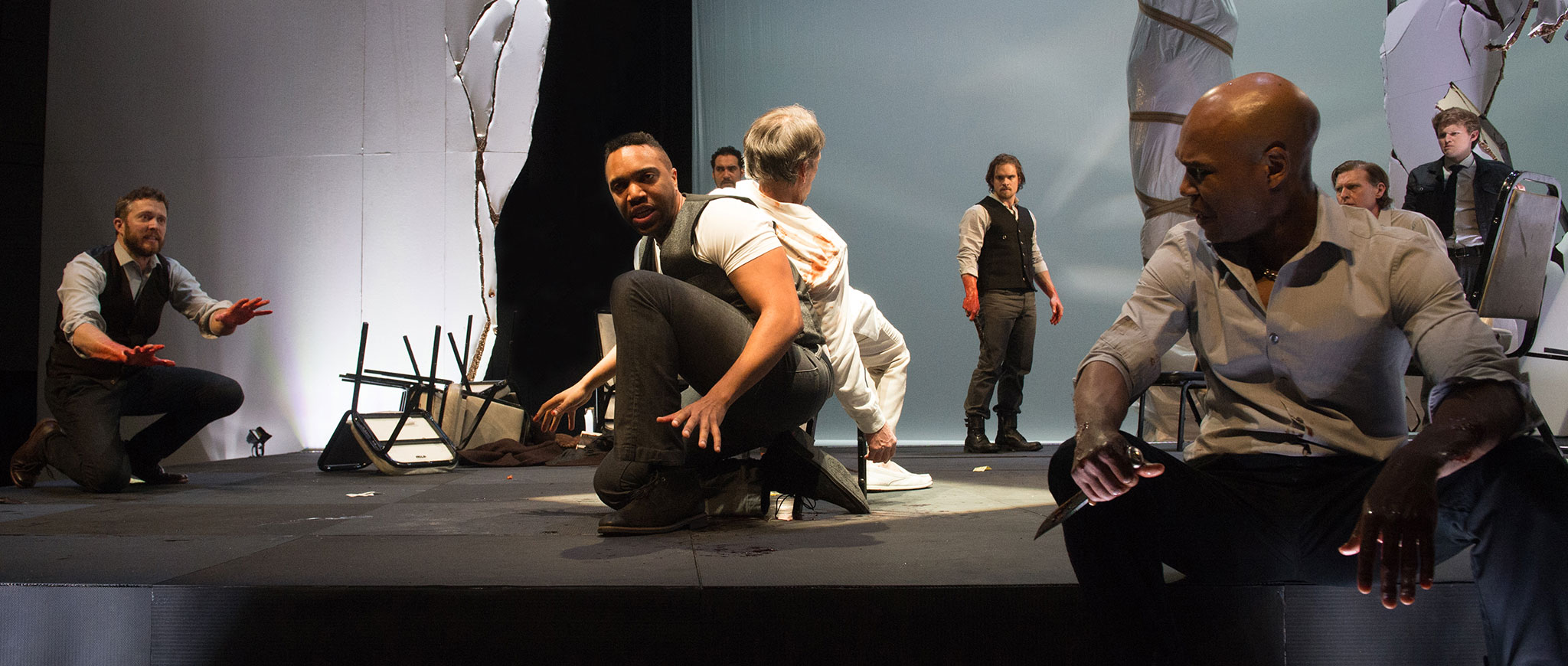On the final night of our trip, we caught Julius Caesar in the indoor Bowmer Theater. Directed by Shana Cooper, this was a modern-dress production, with an incredible set designed by Sibyl Wickersheimer, a visual representation of decay: what looks to be unfinished staging (the sides of the stage floor exposed, the “stairs” made up of building materials that have been left behind or discarded), gray flats that are partially cracked, broken, falling apart (literally, as one chunk falls off midway through the first act).
Weirdly enough, this was the only performance I attended this week that wasn’t sold out. Of course, during the school year, this is probably standing room only, as I imagine it being quite the local field trip destination. However, in midsummer, on a Sunday night (with Merry Wives playing next door in the Allen Elizabethan Theatre), there were quite a few empty seats in the back.
And the people not in those seats missed some incredible performances: Danforth Comins as Marcus Brutus–solid and surprisingly emotional; Rodney Gardiner as Caius Cassius–just great and brittle; Kate Hurster as Portia–very strong (more on that in a minute); Stephen Michael Spencer as Casca–an almost show-stealing performance, wry and bitter and wound tight; and Jordan Barbour as Mark Antony–I said Spencer almost steals the show, but he couldn’t wrest it from Barbour, whose Antony walks that fine line between sympathetic vengeful friend, and cool, calculating, power-hungry jerk.
The major set pieces of the play are well-done: the seduction of Brutus by Casca; the murder; the mob with Cinna the poet; the funeral oration; the appearance of great Caesar’s ghost; the battle between the armies. In the director’s notes, Cooper cites modern dance as an influence on motion in the play. And for much of the play, this works incredibly well: the opening craziness of Lupercal; the murder and its immediate aftermath; a couple of the battle skirmishes. In the latter, the actors performed a kind of martial art kata, stomping their feet, pushing through the crisp uniform simultaneous movements. In the penultimate skirmish, the entire cast (save for the actresses playing the wives) performs the kata, and after a few cycles, actors one-by-one fall in battle…really well done. In another skirmish, they do the same thing, only not in unison, not all facing the audience, and not with knives in their hands, but rather flashlights on a dark stage, facing off against each other…chaos, beautifully captured.
It was wonderful… you can feel the “however” coming, can’t you?
There were some head-scratchers for me: some of the movements seemed…well, random or shoe-horned. The appearance of Hurster in Act Four, Scene Three as the poet on the battlefield…dressed in a military uniform, but a striped shirt…and clown make-up. At first, I thought she was supposed to be Portia’s ghost (before we learn from him that she is dead)…but I don’t that was the purpose. Also to repeat the cool penultimate battlefield kata after the last line of the play just as the stage goes dark was just…anti-climactic.
But that doesn’t negate all the good that came with it…especially a depiction that is near and dear to my heart. I’ve always seen Portia as pregnant. There are accounts of her bearing a child to Brutus, post-assassination. To have her pregnant at Lupercal, highlights the differences between both Calpurnia and Portia, as well as Caesar and Brutus. There are even lines in her conversation with Brutus that support such a portrayal. And this production gives us that. But then, to push it even further, she pulls the hidden dagger from behind her husband’s back, then gives herself the voluntary wound in the thigh during the scene…which was just brilliant. At least, for me. [of course, the props I give the production for this is slightly offset by the actresses appearance as the clown/ghost/whatever… she appeared to be pregnant here as well… was it then the actress and not the character who was pregnant? I don’t know.]
So would I recommend it? Absolutely. Is it the best Caesar I’ve ever seen? I’m not sure about that (my mind still hearkens back to one back around 1990 at the Mark Taper Forum in Los Angeles), but it’s the best one I’ve seen this century…


I saw that production just last night, and this review captures much of my thinking. Some members of our clan thought that Mark Antony’s funeral oration was too frenetic and melodramatic, but I found it both fresh and persuasive; after all, he’s appealing to the emotions of the masses, so it would make sense for him to appear intense and nearly rash. The final kata scene went on way too long for me, and began to feel more reminiscent of an aerobics class than a battlefield. But all in all, I thought it was a really fine accomplshment.